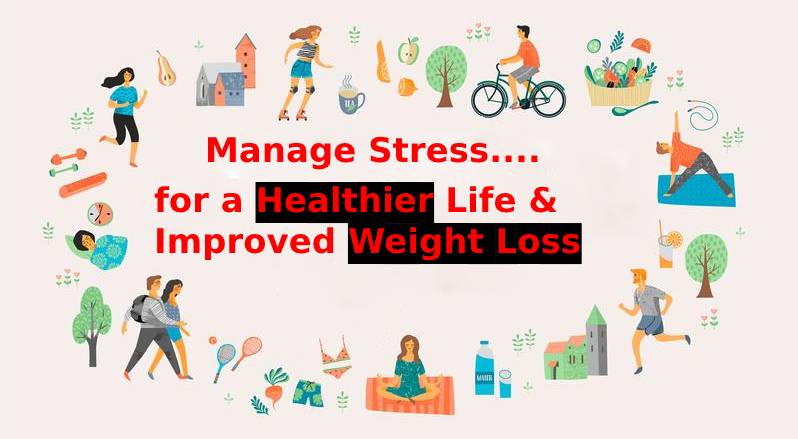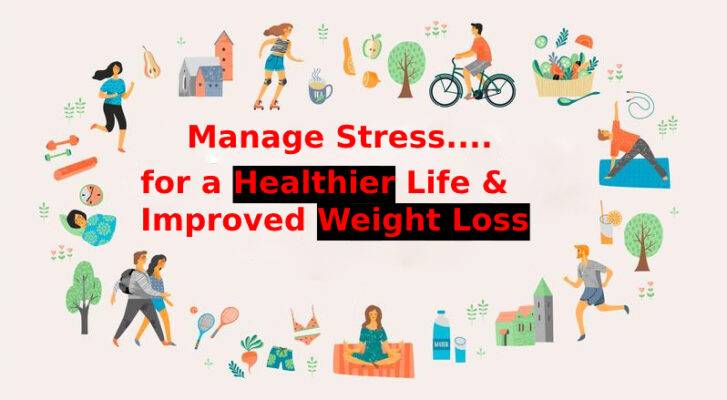
How to Manage Stress for a Healthier Life and Improved Weight Loss

How to Manage Stress for a Healthier Life and Improved Weight Loss
The Impact of Stress on Your Health and Weight
Stress is an inevitable part of modern life, but chronic stress can significantly affect your physical, emotional, and metabolic health. For individuals managing chronic conditions like Type II diabetes or struggling with weight loss, stress often becomes a hidden obstacle, contributing to overeating, hormonal imbalances, and decreased motivation.
The good news? Stress management is within your control. By addressing stress at its root and incorporating holistic strategies, you can improve your well-being and create an environment for sustainable weight loss and better health.
Creative Strategies for Managing Stress
1. Identify Stress Triggers
Understanding what causes your stress is the first step. Is it work deadlines, financial strain, or relationship challenges? Recognizing these triggers allows you to create targeted strategies to address and prevent them from negatively impacting your life.
2. Practice Mindfulness
Mindfulness techniques such as meditation, yoga, and deep breathing exercises help calm your nervous system and bring your focus to the present moment. This reduces anxiety and enhances relaxation, creating mental clarity to tackle challenges effectively.
3. Make Exercise Your Ally
Physical activity releases endorphins, your body’s natural mood elevators. Regular exercise not only combats stress but also improves sleep, boosts energy, and enhances confidence. Activities like brisk walking, swimming, or even dancing can provide both physical and emotional benefits.
4. Prioritize Self-Care
Self-care is essential to resilience. Ensure you get adequate sleep, maintain a balanced diet, and take time for relaxation. Activities like reading, enjoying a hobby, or simply resting can recharge your mind and body, helping you face stressors with renewed energy.
5. Build Strong Connections
Social support is a cornerstone of stress management. Spend quality time with loved ones, join a support group, or engage with your community. Sharing your experiences and leaning on others for encouragement fosters emotional stability and reduces feelings of isolation.
6. Master Time Management
Poor time management can amplify stress. Organize your day with a clear schedule, prioritize tasks, and set realistic goals. By managing your time effectively, you can reduce overwhelm and create a sense of accomplishment.
7. Set Boundaries
Learning to say “no” is a powerful stress management tool. Setting healthy boundaries with colleagues, friends, and family protects your time and mental well-being. Focus on commitments that align with your values and goals.
8. Seek Professional Help When Needed
Sometimes, managing stress on your own can feel overwhelming. Consulting a mental health professional or stress management coach can provide tailored strategies and support to help you regain control over your emotional health.
9. Practice Gratitude
Cultivating gratitude shifts your perspective from stress to positivity. Take a moment each day to acknowledge what you’re thankful for—whether it’s your health, relationships, or simple joys. This practice can boost your overall sense of well-being and reduce stress.
Conclusion: Create a Stress-Free Foundation for Better Health
Stress doesn’t have to control your life. By implementing these strategies, you can manage stress effectively and create the foundation for a healthier, more fulfilling life. Whether it’s through mindfulness, exercise, or setting boundaries, each small step contributes to your overall well-being and weight loss goals.
Stress management isn’t just about feeling better—it’s about living better. Take the first step today to regain control and unlock the potential for a healthier, happier you.
About Dr. Jonathan Spages
Dr. Jonathan Spages, DC, specializes in Functional Medicine, offering groundbreaking solutions for addressing chronic conditions such as Type II diabetes and hypothyroidism. Unlike conventional approaches that rely heavily on medications, Dr. Spages utilizes advanced diagnostic testing and individualized care plans to uncover and address the root causes of health issues. His holistic approach empowers patients to take charge of their health and achieve lasting transformations.







Thks for thinking about me. I am doing better. Having a nurse & PT twice a week.
Great that you are feeling better
Thks for thinking about me. I am doing better. Having a nurse & PT twice a week.
Great
Thks for thinking about me. I am doing better. Having a nurse & PT twice a week. Able to walk now.
Great